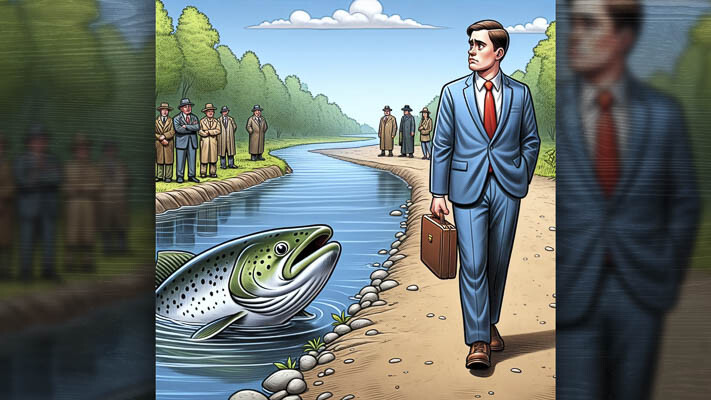
Legislators had a huge amount of money to allocate because the tax on CO2 emissions generated far more money than anticipated
Todd Myers
Washington Policy Center
The legislative session is over, and it had the potential to be very positive for salmon recovery in Washington state. There was bipartisan support for habitat restoration, with several bills being offered by Republicans and Democrats. Legislators also had a huge amount of money to allocate because the tax on CO2 emissions generated far more money than anticipated.

Despite that, the legislature failed to make significant progress funding habitat restoration and streamlining salmon recovery efforts. It is one more wasted opportunity to protect an iconic Washington species that is struggling badly.
The most glaring example of the failure is in the supplemental operating budget, where legislators added about $2.1 billion in new spending. Of that amount, only $1.4 million – about 0.07% – was allocated to four small salmon recovery projects. For comparison, the budget also added $1.4 million for “additional staff and resources to implement the climate commitment act.” Legislators spent as much to add government staff to manage the state’s CO2 tax as they did to help salmon in the supplemental operating budget.
There were also several bills that would have helped streamline salmon recovery, address threats to salmon, or fill funding gaps that failed to move forward. As the Puget Sound Partnership noted in its end-of-session report, “These bills were crafted by a bipartisan group of legislators and looked for non-regulatory solutions to advance salmon recovery. Only two of these bills passed in the 2024 session…” A big, missed opportunity.
First, the successes.
A bill to study the impact of predation by birds on salmon passed and is on the governor’s desk. The number of salmon killed by birds, seals, and sea lions is an underappreciated obstacle to salmon recovery.
The legislature also adopted legislation to address the tire-rubber compound 6PPD which is shown to kill coho salmon at low concentrations. The bill empowers the Department of Ecology to create regulations addressing the impact of 6PPD, requiring agency staff to “specifically consider the effect of regulatory actions on driver and passenger safety.” Regulatory processes can be hit and miss and this doesn’t address the impact of tires that are still on the road, but overall it is a good step to address a significant threat to salmon.
A bill allowing people to adopt a culvert to open fish habitat, like groups adopt highways, also passed. Nice, but not a game-changer.
By way of contrast, several other bills to help accelerate salmon recovery were killed.
A bill we helped craft to remove regulatory barriers for salmon-recovery projects – HB 2193 – died in committee. Legislation to target additional funding to salmon populations that are either near extinction or recovery – HB 2286 – also died. Another bill to address the spillage of untreated sewage into Puget Sound – HB 1365 – was killed. A review of salmon recovery efforts – HB 2463 – also died in committee. Several other bills, including some related to hatcheries, streamside habitat, and accelerating permitting also died.
Many of these bills had bipartisan sponsorship or support. The bills weren’t perfect, but the fact that even those with bipartisan support died early in the session is a lost opportunity to take a big step forward in salmon recovery at a time when salmon populations are struggling.
The capital budget was an area of mixed results, with increased funding offered only if voters keep the CO2 tax. This is an unnecessary restriction that smacks more of politics than a legitimate fiscal concern.
Of the additional $1.3 billion added to the capital budget, about $66 million was added – almost 5% of the increased spending. Given the many other demands, that is not insignificant. The best addition was the restoration of $25 million in funding to the Salmon Recovery Funding Board, which we recommended last year.
All of that funding, however, was made contingent on voters rejecting the repeal of the state’s tax on CO2 emissions. None of the $66 million takes effect until January 1, 2025, but the budget specifically says that the spending is canceled if I-2117 repeals the Climate Commitment Act (CCA).
The claim is that if the CCA is repealed, the funding for these projects goes away. But the funding is already in the state treasury or will soon be. There are three more auctions this year that will occur before voters have their say about the CCA, adding hundreds of millions of dollars in state revenue, a significant percentage of which will go into the Natural Climate Solutions account which is used to fund the salmon recovery projects. The $66 million in spending that is being held until 2025 could easily be funded using money the state already has.
Additionally, the unspent revenue from the CCA doesn’t go back to residents if voters support repeal of the law. It stays in the state treasury for use by legislators. Theoretically, legislators could re-allocate the funding next year, using the already collected revenue if the CCA is repealed. Or they could also use it for other purposes. If funding salmon recovery is a priority, why not allocate the money now?
If the argument is that salmon are a priority, but only if the voters increase taxes, they aren’t a priority.
The combination of bipartisan support and a budget surplus doesn’t come along very often. For salmon, the opportunities presented by that confluence of events were lost in 2024. Let’s hope that’s not the case in the future.
Todd Myers is the director of the Center for the Environment at the Washington Policy Center.
Also read:
- Opinion: An unacceptable tax burdenNancy Churchill outlines new tax proposals in Washington state, warning of growing burdens on working families amid budget shortfalls and government overspending.
- POLL: Is it time for new leadership at Vancouver City Hall?A new weekly poll asks whether Vancouver voters should prioritize replacing the mayor and city council in the 2025 election.
- Opinion: How will the majority party’s new budget and tax proposals affect you?Rep. John Ley critiques the state’s proposed 2025-27 budgets, warning of record-breaking tax hikes and economic impacts.
- Opinion: Washington’s EV sales far short of next year’s state mandateTodd Myers highlights how Washington’s EV sales fall short of next year’s mandate, raising concerns over rising car prices and limited options.
- Letter: ‘Our state and local governments need to learn to live within their means’Camas resident Lauren Colas voices strong opposition to Proposition 1 and other tax proposals, calling for state and local governments to rein in spending.











Well, well. The legislature with a super majority for the Democrats shouts loudly what is important to the liberal side of the legislature. We all knew this was a short (60 day) session and the majority parts had time to prepare for salmon recovery – their way. Even with bi-partisan support, the super majority party controls what goes and what dies. Their priority list did not prioritize salmon recovery. The upcoming elections is our chance to change the majority to conservatives who value salmon recovery.